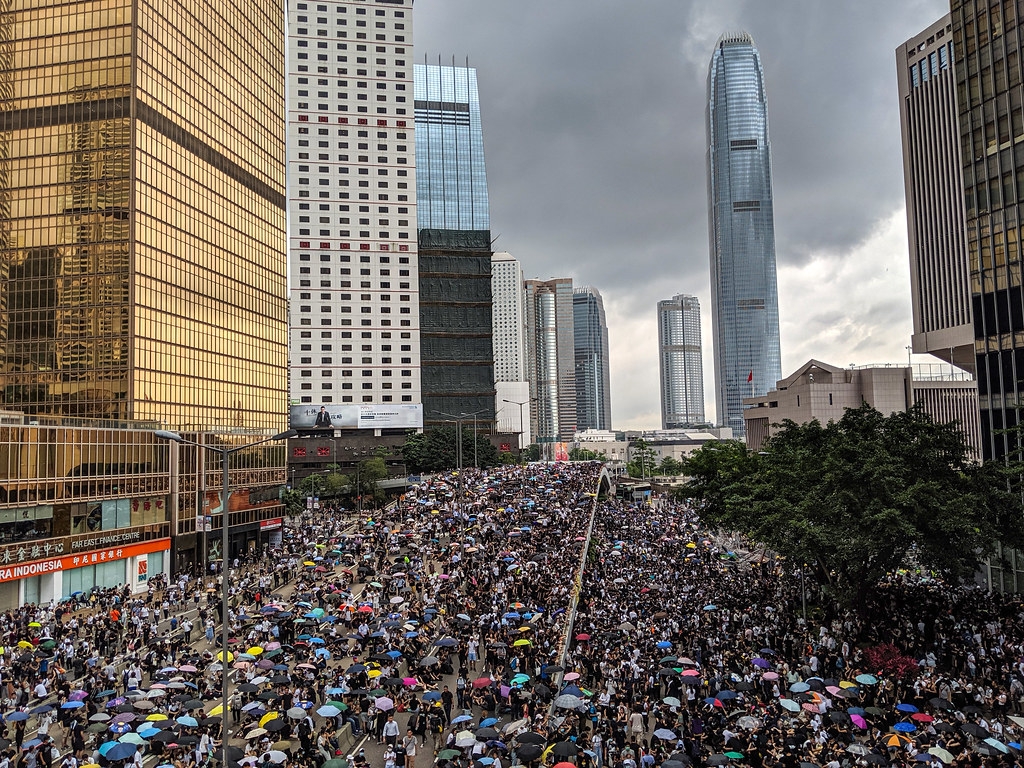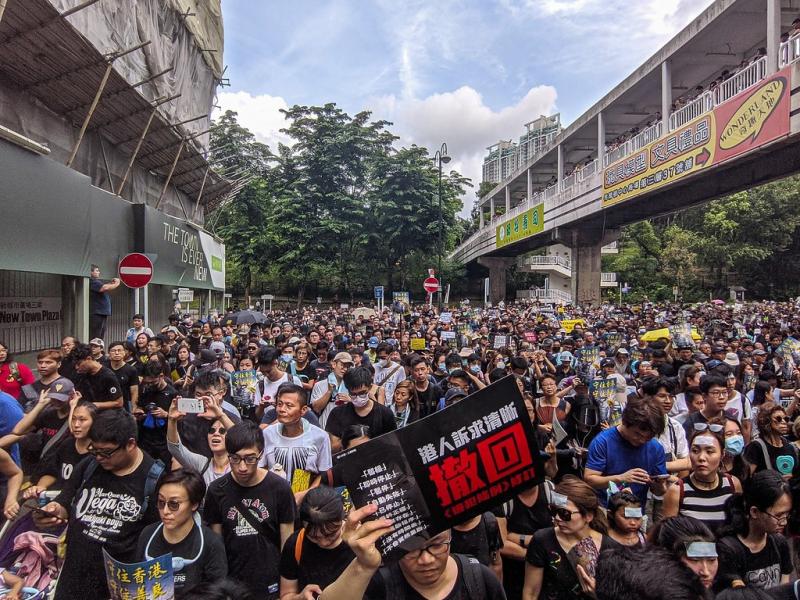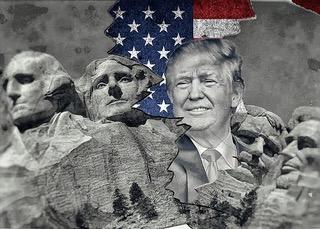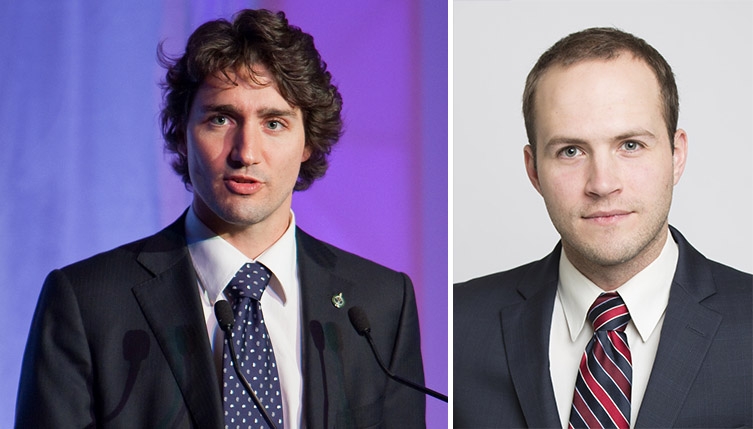
Hong Kong PARADOX – One county, two systems
Photo: Honk Kong anti-extradition bill protest (credit: Studio Incendo via flickr)
The protests in Hong Kong are highlighting the inherent conflicts and paradox of the "One country, two systems" approach. Both the protestors and the Chinese government believe they are righteous in their views on Hong Kong. The Chinese government resents foreign intervention in what they consider to be their domestic affairs. Hong Kong, after all is part of China. This is a fact recognized by the United Nations and countries all over the world, including Canada. The protestors say that China must abide by the special constitutional provisions of the "one country, two systems" approach that was the basis of Hong Kong being returned to China in 1997 in an agreement with Britain and that the Chinese backed government in Hong Kong attempt to impose an extradition bill that would allow local authorities to detain and extradite people from Hong Kong to mainland China is a breach and betrayal of the system's approach.
Hong Kong is part of China but has a unique designation due to its history with the West. Officially, Hong Kong is the Special Administrative Region of the People's Republic of China – a distinct administrative region on the eastern side of the Pearl River estuary in southern China. It has a population 7.4 million people of various nationalities crammed into a 1,104-square-kilometre (426 square-mile) territory, and thus is one of the most densely populated places in the world. This context is important. At the end of WW2 the population was just 1.5 million people.
Originally a sparsely populated area of farming and fishing villages, Hong Kong Island became a colony of the British Empire at the end of the First Opium War in 1842, followed by Kowloon in 1860 after the Second Opium War. The modern territory was completed in 1898 with a 99-year British lease over the New Territories which comprise 86% of Hong Kong's land sovereignty over the territory. This was restored to China in 1997 under a special agreement between the British and Chinese governments called, "One country, two systems." This system was a constitutional principle formulated by Deng Xiaoping, the former Leader of the People's Republic of China (PRC), for the reunification of China during the early 1980s. He proposed that there would be only one China, but that distinct Chinese regions such as Hong Kong and Macau could retain their own economic and administrative systems while the rest of China used the socialism with Chinese characteristics system. Under the principle, each of the two regions could continue to have its own governmental system, legal, economic and financial affairs, including trade relations with foreign countries.

Since reunification in 1997, Hong Kong has remained as a special administrative region with governing and economic systems separate from those of mainland China under the "one country, two systems" designation. Economic ties are strong between the mainland and Hong Kong, with annual bilateral trade valued at over $500 billion. For many in the West, Hong Kong is seen as a gateway to China for those who are interested in doing business on the mainland, accessing the Chinese market, or for stocks or investments. As of December 2018, 22 of the 152 licensed banks in Hong Kong were of mainland interests and around 200 companies from the mainland had regional headquarters in Hong Kong.
According to Investopedia, mainland China is Hong Kong’s largest trading partner and its second-largest source of inward direct investment. The mainland's non-financial direct investment in Hong Kong was $70.05 billion in 2018, accounting for 58.1 percent of the total investment of $120.5 billion, according to the Ministry of Commerce of China. According to Hong Kong's Trade and Industry Department, mainland China is Hong Kong’s main destination for domestic exports (44.2 percent). It is also the biggest supplier of imports for Hong Kong (46.3 percent). Hong Kong is a major supplier of entrepôt services to China. In 2018, the value of goods re-exported through Hong Kong from and to the mainland was $467.6 billion and accounted for 89.1 percent of Hong Kong's total re-export trade value. The ties between China and Hong Kong are indisputable.
The “Hong Kong Way” in Tsim Sha Tsui. Instead of joining hands, most people lit up their phones and covered their right eyes — a gesture against police brutality here pic.twitter.com/pOZeWeDvkK
— Elaine Yu (@yuenok) August 23, 2019
This summer's protests in Hong Kong are in their 11th week. Hundreds of thousands of the demonstrators have taken to the streets against an extradition bill which they say undermines the autonomy of the region and its citizens' rights. Demonstrations against the bill began in March. On June 12, the day the bill was scheduled to a second reading in the Legislative Council, demonstrations turned violent as riot police used tear gas and rubber bullets against protestors. Then, on July 1, during another large protest some demonstrators split from the march and broke into the Legislative Council Complex, vandalizing central government symbols.
On July 9th, Hong Kong Chief Executive Carrie Lam suspended the extradition bill but stopped short of a full withdrawal. Protests continued, escalating into increasingly violent confrontations between police, activists, pro-Beijing triad members, and local residents in over 20 different neighbourhoods throughout the region. Protestors are now calling for an independent inquiry on police brutality as a result of the protests, the release of arrested protesters, a retraction of the official characterization of the protests as "riots", and direct elections to choose Legislative Council members and the Chief Executive. These views are at odds with the Chinese government who say that the proposed amendments to the Fugitive Offenders Ordinance and the Mutual Legal Assistance in Criminal Matters Ordinance are required so they can properly adjudicate criminal matters in Hong Kong. They cite the February 2018 case of Chen Tongjia, a Hong Kong resident who was suspected of murdering his pregnant girlfriend in Taiwan before he fled back to Hong Kong. Hong Kong had no jurisdiction over this case. In order to transfer Chen Tongjia to Taiwan for trial the Hong Kong SAR government proposed the amendments to the above-mentioned ordinances. So far, Hong Kong hasn’t signed any deals with China’s mainland, Macao or Taiwan on the transfer of fugitives and mutual legal assistance in criminal matters. By amending the ordinances, the SAR government hopes to cooperate with China’s mainland, Macao and Taiwan in transferring criminal suspects and fugitives through special arrangements which will help to deal with individual cases and plug the loopholes in the legal system, and enable Hong Kong to work collaboratively with other parts of China to jointly combat crimes and uphold rule of law and justice.
Here's a map showing the Hong Kong protesters' plan to cover the main part of the city with a human chain.
Do you think they will make it? #HongKongWay pic.twitter.com/uj9ZeyVKCc
— Bloomberg TicToc (@tictoc) August 23, 2019
When Hong Kong was reunified with China in 1997 it had signed agreements with 20 countries on the transfer of fugitives and treaties with 32 countries on mutual legal assistance in criminal matters. By proposing the amendments to the Fugitive Offenders Ordinance and the Mutual Legal Assistance in Criminal Matters Ordinance, the Hong Kong SAR government says it intends to incorporate its cooperation with other parts of China into the ordinances regarding fugitive handover and mutual legal assistance in criminal matters. Similar cooperation mechanisms have already been put in place between Hong Kong and foreign countries. They say this arrangement will not affect Hong Kong’s judicial independence at all. “One country” is the prerequisite and foundation of the principle of “one country, two systems." As an important measure to implement this principle, different jurisdictions within China need to conduct mutual legal assistance so as to prevent safe havens for criminals.
Opponents to the change say it will allow the Chinese government in Beijing to extradite any citizen in Hong Kong to mainland China allowing for them to be tried outside the current Hong Kong justice system. Beijing vehemently denies this and adds that the entire matter is a Chinese domestic affair.
To that end, the Chinese Embassy in Ottawa released a paper this week explaining in detail the Chinese government's view of the matter. You can read it here.













